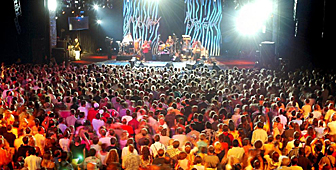Music festivals are big business

Organisers of Switzerland's summer music festivals have successfully transformed small-scale events into big money spinners.
Switzerland plays host to a plethora of pop, rock and jazz festivals over the summer months, and many have turned into cash cows for both the organisers and the towns which host them.
“The bigger the festival, the more important it is for the place where it is staged,” says Markus Simmen, spokesman for Switzerland’s largest concert and outdoor festival promoter, Good News.
“Take the Gurten Festival in Bern, for example, which attracted 45,000 people and had a huge impact on business in and around the city.”
Switzerland also stages a number of classical music events, including the Menuhin Festival in Gstaad.
Tourism authorities there say the mountain resort relies on the event to generate income and boost tourism in the summer months.
“The festival is the biggest summer event and hugely important for our hotels,” said Corinne Reuteler, coordinator of the festival office.
Official estimates suggest that around 15,000 people visit Gstaad during the seven-week long Menuhin Festival, which this year runs until September 7.
Stifling creativity?
Many music events – such as the Gurten and the Montreux Jazz Festival – started life as spontaneous slap-dash affairs, but are now meticulously choreographed shows run by professionals, who are well versed in the art of turning a profit.
Swiss music expert, Christian Strickler, says the net effect is a stifling of creativity.
“When the Gurten Festival first started,” he told swissinfo, “plastic cups were prohibited and everyone brought their own glasses. Today, it is exactly the opposite – you’re not allowed to bring in real glass and everyone uses plastic.”
Loss of originality
Strickler says the festival industry has itself become more plastic and “lost a little of its originality”.
One of the biggest annual events in the summer festival calendar is the Montreux Jazz Festival, which continues to attract artists and audiences from around the world. “Today, only ten to 20 per cent of the acts can really be called jazz artists,” says Strickler, head of musical output at swissinfo.
Claude Nobs, the founder and current director of the Montreux Festival, admits that the annual event which wrapped up last weekend has moved away from its jazz roots in recent years and now attracts more mainstream pop and rock artists.
“We really need the big names who are guaranteed crowd pullers,” Nobs says. At this year’s sell-out closing night in Montreux, artists as diverse as Joe Cocker and Senegal-based Youssou N’Dour took to the stage.
Simmen does not believe Montreux’s traditional roots are being sacrificed as the festival expands.
“If you look at the schedule in Montreux, you can still find some jazz musicians,” Simmen told swissinfo, “and it’s also significant that they give young performers the chance to take to the stage.”
Big budgets
Michaela Silvestri, organiser of June’s Open Air festival in the city of St Gallen, says the biggest names in music are drawn to perform in Switzerland by the multi-million franc festival budgets.
“We have the reputation for being a rich country,” Silvestri said in an interview with the “Neue Luzerner Zeitung”, “so artists want to cash in on this as much as possible.”
With a budget of SFr3.5 million, the 2002 Gurten Festival was able to attract top-name Swiss and international artists – and organisers believe they will still make a comfortable profit when all the accounting is done.
But Strickler says many artists are also keen to perform in Switzerland because they know they will receive a warm welcome.
“The Swiss are tolerant, open and like music, but at the same time they will criticise where appropriate,” he says.
Efficient and organised
Strickler says today’s generation of festivals are efficient, well-organised and popular. But he argues that the 21st century commercialisation of live music means concerts and outdoor events are no longer comparable with those of the 1970s.
“Back in those days,” Strickler reminisces, “there were often serious technical problems and organisers and bands had to improvise a lot.”
Today, he adds, festivals run like clockwork, are “very organised and professional, but in the process have lost some spontaneity.”
swissinfo

In compliance with the JTI standards
More: SWI swissinfo.ch certified by the Journalism Trust Initiative








You can find an overview of ongoing debates with our journalists here . Please join us!
If you want to start a conversation about a topic raised in this article or want to report factual errors, email us at english@swissinfo.ch.